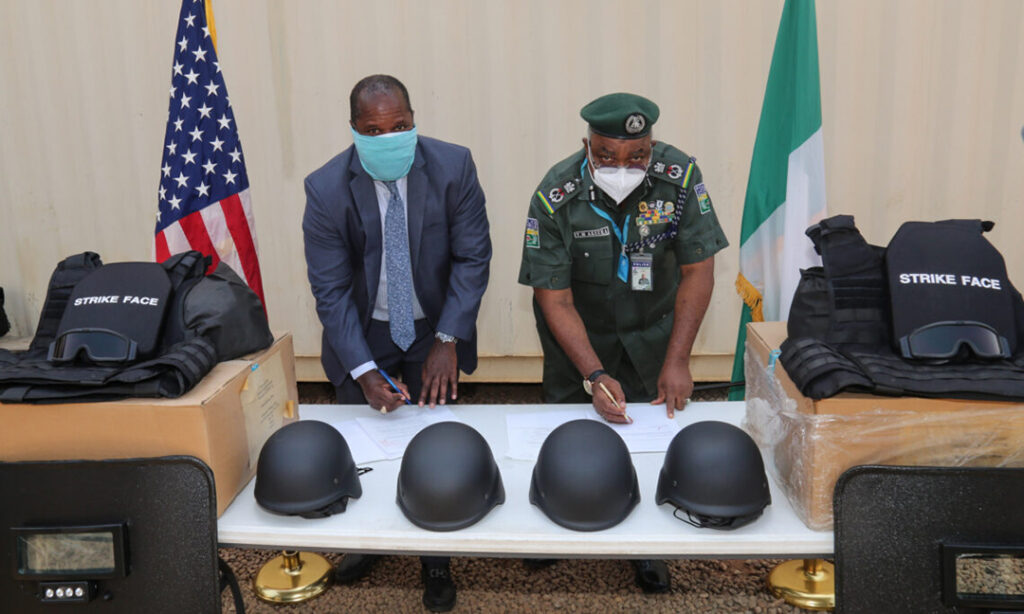ADF STAFF
Borno State in Nigeria is the birthplace of Boko Haram’s armed uprising. It’s also the province that has been hit the hardest.
The terror group has wrought havoc and killed tens of thousands since it formed in the northeastern region in 2009.
In the past year, Nigerian President Muhammadu Buhari has worked to expand the size and scope of paramilitary and police forces.
The United States is supporting those efforts.
“We will direct our attention and strength to reenergizing and reorganizing the security apparatus,” Buhari pledged in a New Year’s Day broadcast amid a spike in insurgent violence.
To assist, the U.S. Embassy in Abuja donated equipment worth more than $325,000 to the Nigeria Police Force to help keep the peace in the northeast.
The U.S. provided bulletproof vests, bulletproof helmets, goggles and 20 ballistic shields to the 500 officers of the Police Mobile Force (PMF) serving in the state. The U.S. also donated a tent, mosquito nets, first-aid boxes, hygiene products, heavy-duty flashlights and foldable mattresses.
James Jewett, director of the embassy’s office of International Narcotics and Law Enforcement, presented the equipment to Nigeria’s commissioner of police for the PMF, Mohammed Akeera, in a January 29 ceremony in the country’s capital.
“We are proud to stand with Nigerian law enforcement on the front line of maintaining peace and security,” Jewett said. “This donation will improve the health and security of those brave men and women committed to providing law and order.”
The 40,000-strong PMF is spread across the country in 79 squadrons. Established in 1961, it has evolved into a security, anti-crime and counterterrorism force. It even has some units deployed as international peacekeepers.
Despite five years of declining terrorism from 2014 to 2019, according to the Global Terror Index, Nigeria in 2020 still ranked third in the world behind Afghanistan and Iraq among countries affected by terrorism.
The situation in Borno State has worsened significantly, as Boko Haram has stepped up attacks and kidnappings in recent months while menacing most of the major roads around the state capital, Maiduguri.
Dozens of farmers were massacred as they worked in the fields of Zabarmari in late November 2020, an atrocity that garnered international headlines and condolences.
Speaking to reporters at the victims’ funerals, Borno State Gov. Babagana Zulum called for more security forces in the region.
“This is very sad,” he said. “Our people are in very difficult situations. They are in two different extreme conditions. On the one side, they stay at home and they may be killed by hunger and starvation. On the other, they go out to their farmlands, they risk getting killed by the insurgents.”
Zulum has firsthand knowledge of the terror threat in Borno State. Last year, Boko Haram attacked his convoys three times in three months. He escaped unhurt.
After one of those attacks, in which 30 security forces were killed, Nigerian Police Inspector-General Mohammed Adamu released a statement attempting to reassure citizens of the region:
“The morale of police officers and other security agencies involved in providing security, especially in the state, has not and will not be dampened by the incident.
“Rather, the incident has further served as an impetus in strengthening the resolve and commitment of the personnel of the force in the fight against insurgency.”

